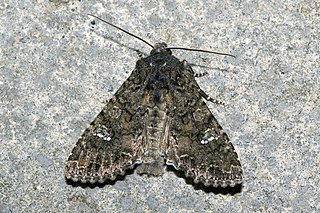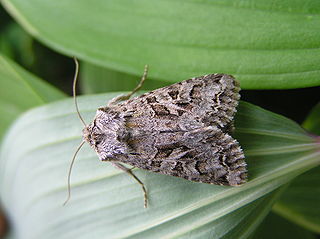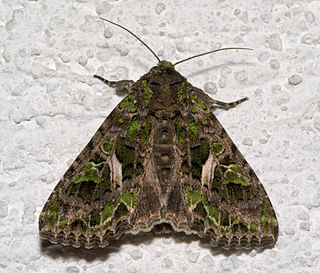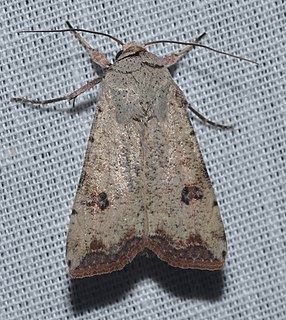
The cabbage moth is primarily known as a pest that is responsible for severe crop damage of a wide variety of plant species. The common name, cabbage moth, is a misnomer as the species feeds on many fruits, vegetables, and crops in the genus Brassica. Other notable host plants include tobacco, sunflower, and tomato, making this pest species particularly economically damaging.
Ferdinand Ochsenheimer was a German actor and entomologist (lepidopterist).

The Hadenini are a mid-sized tribe of moths in the Hadeninae subfamily. As numerous hadenine genera have not yet been assigned to a tribe, the genus list is preliminary.

The Calpini are a tribe of fruit-piercing moths in the family Erebidae; formerly they were included in the family Noctuidae. The proboscis of the adult moths of this tribe is pointed and barbed, allowing the moth to pierce the skin of fruit to drink the juice. The vampire moths in the genus Calyptra can pierce mammal skin to drink blood.
Episema is a genus of moths of the family Noctuidae. The genus was described by Ochsenheimer in 1816.

Nonagria is a genus of moths of the family Noctuidae first described by Ferdinand Ochsenheimer in 1816.

Plusia is a genus of moths of the family Noctuidae. The genus was erected by Ferdinand Ochsenheimer in 1816.

Polia is a genus of moths of the family Noctuidae described by Ochsenheimer in 1816.

Simyra is a genus of moths of the family Noctuidae. The genus was described by Ochsenheimer in 1816.

Trachea is a genus of moths of the family Noctuidae erected by Ferdinand Ochsenheimer in 1816.

Anicla infecta is a moth of the family Noctuidae, described by Ochsenheimer in 1816. It is known as the green cutworm when a caterpillar and the green cutworm moth when mature. It is found from south-eastern Canada through the eastern United States and south to Brazil.

Heliothinae is a small subfamily of moths in the family Noctuidae. There are about 400 species described worldwide. They are found predominantly in semiarid subtropical habitats.

Noctuina is a subtribe of cutworm or dart moths in the family Noctuidae. There are at least 170 described species in Noctuina.
Noctuini is a tribe of owlet moths in the family Noctuidae. There are at least 520 described species in Noctuini.

Leucaniini is a tribe of cutworm or dart moth in the family Noctuidae. There are at least 40 described species in Leucaniini.












